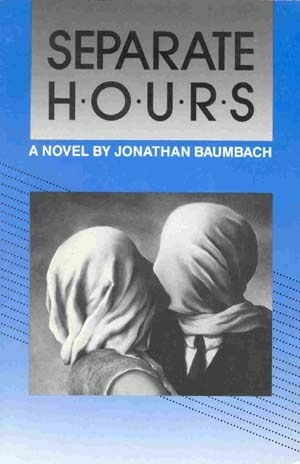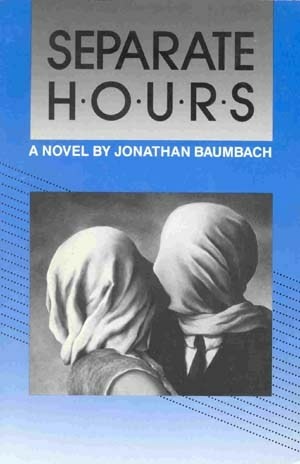A love story about the betrayal of love
A disturbingly honest, elegantly imagined unveiling of the way truth becomes elusive in a long-term relationship, Separate Hours is a love story about the betrayal of love. Yuri and Adrienne Tipton, both psychotherapists, conduct their separate practices in a shared basement office in an upper Westside New York brownstone. They also share a ten-year-old daughter, a too-comfortable life, an apparently happy marriage, and a connectedness that blurs the edges of their separate identities. Who is telling the real truth? Can either of the novel’s narrators be taken at their word? Adrienne and Yuri tell the story of their life together (and apart), trying to make sense of the darkly irrational. When Adrienne claims that in a movie of their lives, she would be the more sympathetic character, the novel, to test her premise, gives us a possible scenario for the movie. In the further quixotic pursuit of clarity, the novel turns Yuri and Adrienne’s marriage into a case study prepared for a psychoanalytic journal. Separate Hours zeroes in on their marriage and the few things outside that come close enough to get caught in its tentacles. For all the novel’s comic elements, it underlying vision is dark. From the moment of Yuri and Adrienne’s initial meeting, they embrace the conflict. Although they appear to understand what drives them, their behavior for the most part is blindly compulsive and deathbent. Self-knowledge has little impact of how they live their lives. Baumbach’s seventh novel examines a postmodern marriage in crisis, as if it were a “patient etherized upon a table.”
A disturbingly honest, elegantly imagined unveiling of the way truth becomes elusive in a long-term relationship, Separate Hours is a love story about the betrayal of love. Yuri and Adrienne Tipton, both psychotherapists, conduct their separate practices in a shared basement office in an upper Westside New York brownstone. They also share a ten-year-old daughter, a too-comfortable life, an apparently happy marriage, and a connectedness that blurs the edges of their separate identities. Who is telling the real truth? Can either of the novel’s narrators be taken at their word? Adrienne and Yuri tell the story of their life together (and apart), trying to make sense of the darkly irrational. When Adrienne claims that in a movie of their lives, she would be the more sympathetic character, the novel, to test her premise, gives us a possible scenario for the movie. In the further quixotic pursuit of clarity, the novel turns Yuri and Adrienne’s marriage into a case study prepared for a psychoanalytic journal. Separate Hours zeroes in on their marriage and the few things outside that come close enough to get caught in its tentacles. For all the novel’s comic elements, it underlying vision is dark. From the moment of Yuri and Adrienne’s initial meeting, they embrace the conflict. Although they appear to understand what drives them, their behavior for the most part is blindly compulsive and deathbent. Self-knowledge has little impact of how they live their lives. Baumbach’s seventh novel examines a postmodern marriage in crisis, as if it were a “patient etherized upon a table.”
This is Jonathan Baumbach's most accessible novel and should win him a large readership.'
—Bharati Mukherjee
Baumbach employs a variety of narrative voices in his well-crafted new novel, but none of them, he makes it clear, are to be trusted. Obtusely analytical Manhattan psychotherapists Yuri and Adrienne Tipton take turns describing the tortured, slow-motion disintegration of their ‘relentlessly painful relationship.’ Baumbach perfectly captures the bland analysts’ language that disguises scathing verbal abuse as simple observation.’
—Publishers Weekly
Jonathan Baumbach is the author of numerous books of fiction, including Babble, Chez Charlotte & Emily, Seperate Hours, The Life And Times Of Major Fiction, D-Tours, and B. Also a widely published and anthologized short story writer, he has appeared in O. Henry Prize Stores and Best American Short Stories. He has written about movies for Partisan Review and is a former chairman of the National Society of Film Critics.





